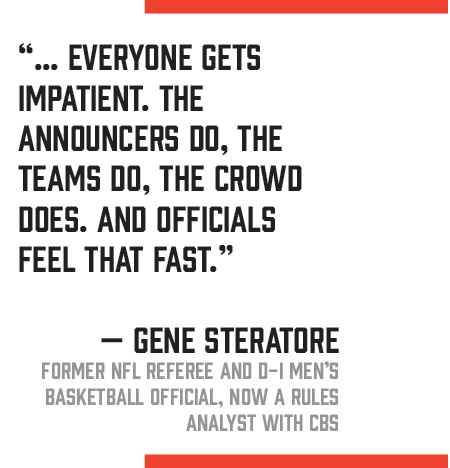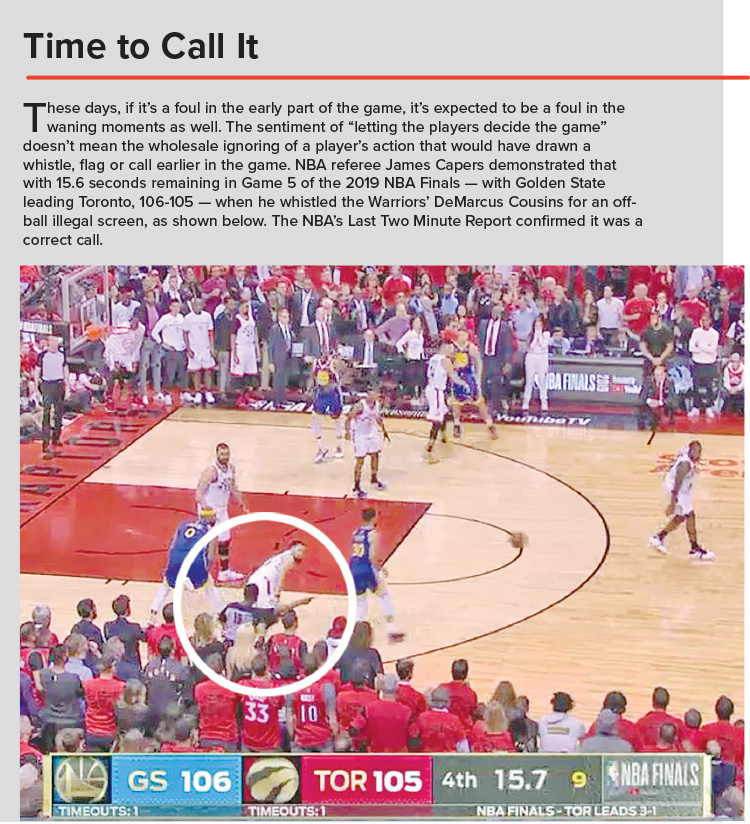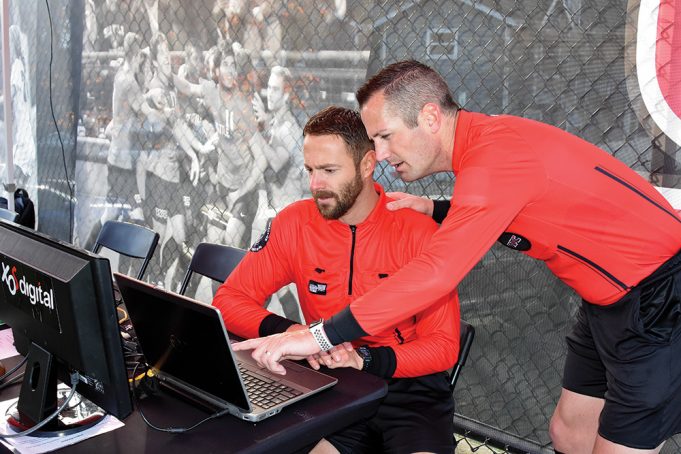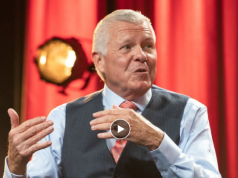Officials are taught to maintain focus and concentration from the moment they walk on the field or court to the final whistle and sometimes beyond.
But it’s especially important to focus in the late stages of a contest, and not because the result may be determined in those waning moments. Whatever the score or impending result, the emotional pitch of a game often changes in the late going, often gradually but sometimes dramatically.
The problem is that the pressure doesn’t stop there. Most everyone wants decisions quickly.
Regardless of whether replay is available, officials need time to sort out strange situations and keep the game under control.
 When replay is available, there is pressure to make decisions in a short period of time. Without replay, it’s still important for officials to talk things through. While everyone else is wanting information and decisions quickly, you must take as much time as necessary to get things right.
When replay is available, there is pressure to make decisions in a short period of time. Without replay, it’s still important for officials to talk things through. While everyone else is wanting information and decisions quickly, you must take as much time as necessary to get things right.
Reviews in the Closing Minutes
J.D. Collins, recently retired NCAA national coordinator of men’s basketball officiating, stresses the importance of crew communication during late-game stoppages. During the closing minutes of a college basketball game, a greater number of plays are subject to review. Consequently, officials may make some extra trips to a courtside video monitor. Here again, Collins stresses the importance of communication, specifically, between the officiating crew and the coaches.
“The coaches want to know, ‘Why are you over there?’” he said, “And so our job is to communicate to them, ‘We’re looking at the time,’ or ‘We’re looking at whether or not that was a flagrant foul.’ Just informing them why we’re there calms a coach down.
“The worst-case scenario is we’re at the monitor and they don’t know why we’re there. It causes coaches angst. It’s the end of the game and we need to bring the coaches to as calm a level as we can so we don’t have interference by somebody constantly trying to run over.
“Go tell them what we’re looking at, then go look at it, then tell them the result. That’s the standard protocol of what happens when we go to the monitor.”
As the use of video review has become more common, critics have contended that reviews are taking longer than they should. But Collins points out that initiating the review process takes time.
“When it’s a minute-and-a-half in and (broadcasters) say, ‘This is taking forever,’ the officials probably stood there for 45 seconds waiting for the feed to get to them,” he said.
Once the review process actually begins, the crew may have four or five angles to look at (during the regular season) to perhaps a dozen (in the NCAA tournament). Reviewing those angles, often more than once, takes time. And it’s imperative the crew review every angle available unless or until they receive the definitive information they need. The consequences of not looking at every available angle and perhaps missing a piece of information that could be significant are obvious.
“If it takes on average, 42 seconds per review during a regular-season game to look at four angles, and you’re looking at up to 10-12 angles (during the NCAA tournament), that can take quite a bit of time,” Collins said. “But it’s necessary to get the play right.”
Collins noted that for review purposes the game is divided into two distinct segments. “During the majority of the game, you get in and you get out,” he said. “Get in, see what you need to see, make a decision, get out.
“But when the outcome of the game is in the balance, there’s more grace provided you as an official to get the play right. Because if you rush through the process, and you don’t wait to look at the next angle, or the following angle, and those two angles would have changed your decision, you didn’t get the play right. The amount of time taken is a secondary issue.”
When Gene Steratore was working in the NFL, most video reviews occurred during commercial timeouts. When he was working NCAA Division I basketball, he understood the importance of not rushing through the review process.
“Even though we only had 60 seconds to view under the hood (in football), we still had a two-minute break,” he points out. “When (video reviews) would occur in basketball, the clock wouldn’t seem to go as fast in my mind. I understood that you had to be deliberate. I also understood the luxury of making sure that when you were ruling in replay … that if you do not have a ‘kill shot’ as you’re going through those replay reviews, you do not leave that table until you have seen every replay.”
Steratore, who is now a rules analyst for CBS, understands that broadcasters and TV viewers become impatient during reviews.
“Anytime we have downtime and (the officials) are the focus of that downtime, everyone gets impatient,” he said. “The announcers do, the teams do, the crowd does.
“And officials feel that fast. Twenty seconds on a football field, stopping the game, or 20 seconds on a basketball court, stopping the game to discuss something administratively, or for replay, feels like hours to everyone, including the officials.”
Officials working at lower levels may not have replay issues to consider in the late stages of a game but there are still issues they need to keep in mind.
In some instances, under NCAA football rules for instance, timing rules change in the final minutes of a game. The entire crew, not just the referee, needs to be aware of when those changes take effect to be sure the game is not improperly extended or shortened. This is something that should be reviewed during the pregame conference.
Heading ‘Down the stretch’
When the game approaches the late stages, the complexion of the competition often changes. But officials — regardless of whether facing a final call, final no-call or going to replay — should not change how they do things. The approach should remain the same throughout the game.
 Don’t pass on a call in the waning moments of a contest because, “The kids should decide the game.” Officials who take that stance are really saying, “I don’t have the courage to make a game-deciding call.”
Don’t pass on a call in the waning moments of a contest because, “The kids should decide the game.” Officials who take that stance are really saying, “I don’t have the courage to make a game-deciding call.”
James Breeding did all officials proud with his foul call at the conclusion of the Virginia-Auburn NCAA men’s D-I basketball semifinal game in April 2019. Contrary to what some were led to believe, it was a foul that would have been called at any other point in the game; there was no reason for it not to be a foul with 0.6 seconds remaining.
What's Your Call? Leave a Comment:
Note: This article is archival in nature. Rules, interpretations, mechanics, philosophies and other information may or may not be correct for the current year.
This article is the copyright of ©Referee Enterprises, Inc., and may not be republished in whole or in part online, in print or in any capacity without expressed written permission from Referee. The article is made available for educational use by individuals.



















